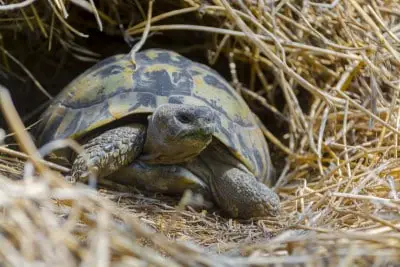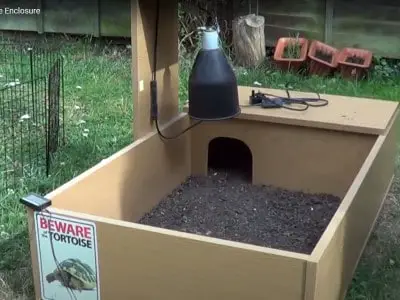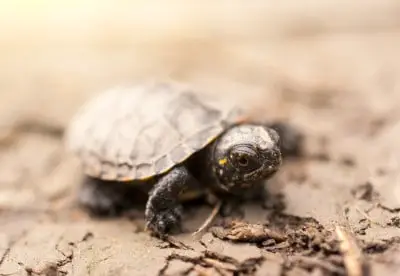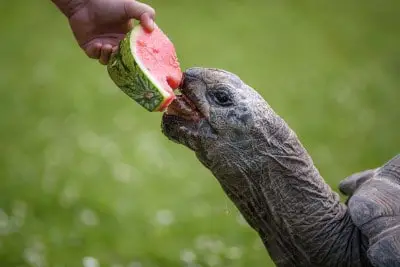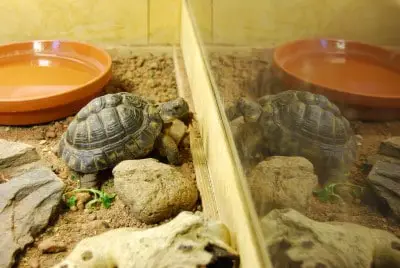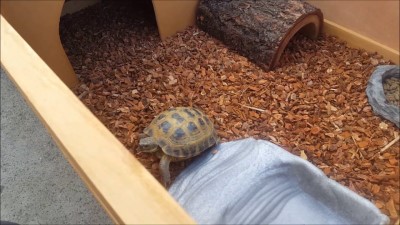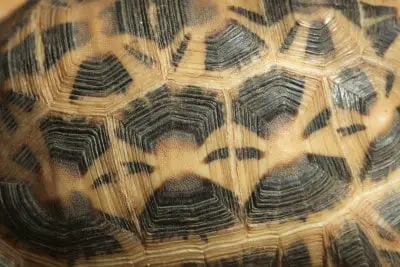Tortoises are terrestrial animals; therefore, they will thrive best if placed in an environment that suits their characteristics. However, due to various reasons, most tortoise owners prefer placing their pets in an enclosure. Therefore, if you are new to the family of tortoise owners, you must be wondering whether it is okay to take your tortoise outside.
You can only leave your tortoise outside if you are confident that they are safe from the harsh weather and dangerous predators. They need a secure outdoor enclosure from the elements and enemies and a heat source when it gets chilly. Your pets can stay there all year round as long as you help them hibernate when they need to or bring them inside if they are not the hibernating species.
Your pet needs regular fresh air and sunlight, but there are several factors to consider. This article aims to give you the ropes on how to keep your pets’ interests in mind as you take them outdoors.
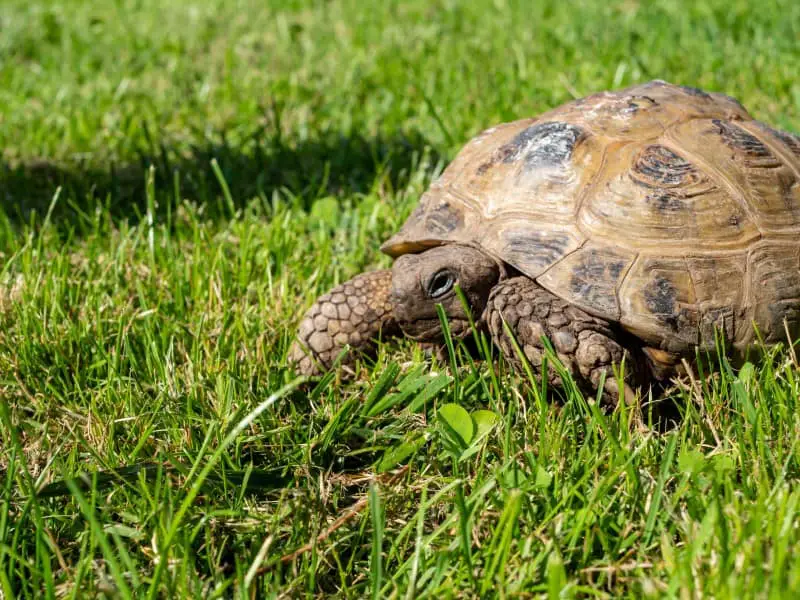
Can Tortoises Be Kept Outside?
Your first thought about tortoises being outside is that if their counterparts are okay roaming in the wild, then your pet can too. Your assumption is correct, and they can indeed live outside as long as they are safe and healthy. When in the wild, they go through various challenges and still survive. Their instincts kick in to guide them on the best place to look for food and how to escape predators. Your tortoise’s life as a pet is better because they get food, water, and a safe place to call home.
The most important consideration with keeping your tortoise outdoors is their safety. Therefore, you need a secure outdoor enclosure. Tortoises are pretty adventurous and tend to get lost in the process. Similarly, predators can target them and attack unless you have a solid fence to keep them away. Taking your tortoise outside lets them bask for a healthy shell and general well-being. Sunlight contains the nutrients they need for vitamin D3 synthesis, which is necessary to utilize calcium in the body.
Calcium in tortoises supports the nervous system development as well as the growth of the bone and the shell. Without it, the reptile may suffer from the infamous MBD (metabolic bone disease), which can be fatal. Another advantage of life outdoors is that your pet can roam around freely as they breathe in the fresh air. The serene and quiet of the outdoors go a long way to improve your pet’s quality of life. Besides, the distances they trek in a day counts as an excellent exercise for their joints.
Can I Leave My Tortoise Outside at Night?
Any first-time owner would freak out at the thought of leaving their pets alone and unsupervised at night. You may not initially be welcome to the idea, but it is acceptable to leave your pets outside as long as they are safe and have everything they need. However, it depends on the state of their outdoor enclosure, the country you live in, your pet’s size and age, and the presence of predators.
The main concern is usually safety, but as long as their home is lockable and secure on all sides, you are safe to leave them outside. You also need to ensure that your compound is safe such that predators cannot break into the compound. On the contrary, it may not be a good idea if your neighborhood has a high predator population because they will find a way to attack even during the day. Secondly, if your region tends to get freezing at night, you can either keep your pet indoors or provide a heating system to keep them warm.
Another critical consideration is your tortoise’s age and size. Since the hatchings and juveniles are rather sensitive, it is best to keep them indoors at night under your watch. However, you can leave the mature ones outside, as long as the prevailing conditions are suitable. It would be best if you also considered your peace of mind. If you are restless about letting your tortoise sleep outside, especially for the first time, it’s best to keep your pet inside until you are sure.
Alternatively, you can ease into it by letting the tortoises stay for a few hours and add the time as you go, and eventually, you will be more comfortable with them staying outdoors. Some owners are also keen on living in the outdoors because it has a wild feeling, and the tortoise gets a sense of freedom and can set its own rules.
Can a Tortoise Live Outside all Year?
Tortoises can comfortably live outside all year round as long as the conditions are suitable; what matters is the weather and their species. For instance, your pet will be okay if you can provide heat for them to last the cold nights and bring them in when the temperatures are freezing. You would have no problem leaving them outside during spring, summer, or autumn. The only concern comes in during winter when the temperatures go below the recommended levels.
You may also want to initiate hibernation in certain months by either letting them stay outside or bringing them inside to facilitate it. Some owners prefer keeping them in fridges to be sure that they hibernate uninterrupted. On the other hand, there are some tortoise species like the sulcata, red-foot, and the leopard tortoises that don’t undergo hibernation. Therefore, they need warmth all year round, and the only way to help is to bring them inside during the cold months.
If the freezing conditions outside would be fatal to your tortoise, it is best to let them stay in the house as they wait out the winter to keep safe. Lastly, it is advisable to stop your pet from hibernating if it is ill by warming them up inside during winter.
Can a Tortoise Get Too Hot Outside?
Every keeper needs to be mindful of their pet tortoise’s well-being to ensure that they live a happy, healthy, and comfortable life. Environmental factors also significantly affect the reptile. Therefore, you should watch out for the prevailing temperatures, especially when they live outdoors. Tortoises are cold-blooded animals that go by the dictations of the temperatures in their immediate surroundings. When it is too hot, their temperature levels will increase and reduce when the temperatures are too low.
Tortoises can overheat outside in the sun, especially if there is no shade to retreat when it gets scorching. The reptiles have the advantage of sheltering under trees when in the wild or burrow to regulate their body temperatures. Thus, if you keep the tortoise in your garden, you can set up their enclosure near a tree or any structure to provide shade. You can also make a simple hideout for them, preferably a white wooden structure to help guard them whenever the sun rays get intense.
Fortunately, the reptiles are instinctively wired with the ability to dig. Therefore, you can loosen the topsoil if they need to burrow as they shelter from the heat. On the other hand, you can bathe your pet regularly or let them soak in water during summer. You can also provide clean and fresh drinking water to help in hydration. Note that excess heat is fatal for tortoises since their system cannot withstand it. Lastly, don’t let your tortoise live in a greenhouse unless the doors are open to leave room for the release of extra heat.
Can a Tortoise Get Too Cold Outside?
Tortoises are cold-blooded reptiles, meaning they don’t generate their heat. As a result, they rely on external heat sources to maintain their metabolic processes. Therefore, tortoises can get cold and freeze to death in extreme temperatures. A tortoise in an outside enclosure has a well-developed mechanism regarding temperature changes. Thus, they need to hide or burrow when the temperatures are high and bask at low temperatures.
On the contrary, those indoors are not accustomed to abrupt temperature changes, which puts them at greater risk in freezing temperatures. If you have your pet in an indoor enclosure, it is advisable to let them stay put when the temperatures are below 12 degrees. These levels would be too cold, and, in turn, expose the tort to fatal respiratory conditions such as pneumonia and other related health conditions. If you have to take it outside, you can do so on sunny days (at temperatures of 26-30 degrees) and only let them stay for about an hour.
Scorching temperatures are unsafe for their health, and one way to tell is when your pet starts hiding from the sun. Tortoises in an outside enclosure should not stay out during winter, even when used to temperature changes. Some winters can be too aggressive and increase the chances of them freezing to death. You can avoid this by letting your pet spend the winter indoors unless you can let them hibernate safely.
Can Tortoises Be Left out in the Rain?
Usually, tortoises enjoy rainfall since it hydrates and cools them off. Leaving a tortoise in the rain is safe and healthy, provided that you put in place certain precautions to prevent any fatalities. Letting them have fun in the rain simulates their life in the wild, making them more comfortable even in captivity. However, having your little friend wallow in the rain depends on the rainfall intensity and the temperature changes.
The rain will force their body temperatures to drop, and since there is no sunlight, it is wise to provide an alternative heat source for warmth. A UV light bulb can release similar rays to the sun. If you have it set up, the tortoise will be safe to enjoy a toss in the rain once in a while. Otherwise, you have nothing to worry about if the downpour can’t interfere with the temperature levels. Rainforest species like the red-foot tortoises are accustomed to heavy downpour and can manage as long as there are no significant changes.
The only cause for alarm with such species is when you notice that they are uncomfortable due to a sudden drop in their body temperatures. Some tortoise species can’t handle rainfall well. If their enclosure floods, they will soak in the cold rainwater all night, which lowers their body temperature levels. In extreme cases where the rain is excessive, the chilly conditions can initiate hibernation, a process that can be fatal to the reptile.
Furthermore, if you must let your buddy stay outside, it is essential to improve the drainage in their enclosure. You can provide a shelter where they can hide from the excess rain and an additional heating source; this way, your shelled friend wouldn’t catch infections and diseases that come with cold weather.
Can Tortoises Hibernate Outside?
Once the temperatures are far below the optimum, at about seven °C, the reptile won’t withstand it and end up hibernating. Typically, this occurs during the cold seasons or winter when their body metabolism is too low, rendering them into a state of inactivity. Some keepers can simulate an environment to enable the torts to aestivate in captivity, but it may not guarantee their safety. Provided that the conditions are favorable for the reptile to hibernate, they will go through it regardless of the location, whether indoors or outdoors.
Tortoise species that live in the deserts or those in moderated environments can go without hibernating, and it won’t affect their health in any way. In contrast, tortoises in outside enclosures can hibernate naturally or with a bit of help from the owners. In the first instance, the reptile can dig the ground or need your help to burrow. If you want to help, you should ensure that the hole is free from flooding, frost, and predators.
Monitoring the tortoise while inside the burrow they have made may be tasking. Therefore, it is recommended to help instead. You can provide a box that is impervious to light and rain and check that the temperatures do not rise to wake them up prematurely; this way, your friend will hibernate safely and won’t necessarily need your strict supervision.
Wrap Up
The most crucial factor to consider when letting your tortoises stay outside is their safety. They need a secure outdoor enclosure, preferably lockable, to keep other animals at bay. They also need help to live in optimum conditions where they can get the warmth they need, and the only way to help is to provide an artificial heat source.
If you found this article helpful, share it so that it may help other tortoise lovers like you.
Read more:

